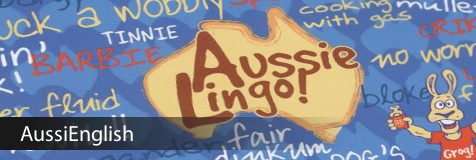 G’day everyone,
G’day everyone,
AussiEnglish 2.
 Published by
Cūstōs
on March 25, 2009
Published by
Cūstōs
on March 25, 2009  Leave a comment
Leave a comment
we’re going to deal with some colloquialism again and I’m going to focus on the topics ’Greetings & Farewells’ and ’Communication’ in the Slang Section. Happy, huh? ;)
Colloquial Column
A rude or aggressive Australian (Aussi ;)) man can be labelled as an ocker, e.g. You’ll have to forgive him; he’s just an ignorant ocker.
The didgeridoo (plural –oos) is a typical Australian musical instrument consisting of a long wooden tube which you blow through to produce a variety of deep sounds, e.g. There was a young Australian in the shopping centre playing a didgeridoo.
Station can mean a large sheep or cattle farm in Australia or New Zealand and often stands in compounds, e.g. They live on a sheep station north of here.
A man may be called a bloke and you can address a male friend of yours as mate, e.g. Struth! [gosh/wow] Look at that bloke over there, mate!
A wild dog in Australia can be called a dingo (plural –oes) and an area of wild land that has not been cleared as the bush, e.g. Be careful of the dingoes when you’re out in the bush.
The area of Australia that is a long way from the coast and the towns, where few people live is named the outback, e.g. Travelling across the outback in Oz can be dangerous, but there are some beaut places to see.
Slang Section
To start with, it’s quite common to say g’day, gidday or gooday instead of hello as a greeting in AustralE. If you want to say goodbye, you can use hooray, hurroo or hooroo as well.
Turning to the topic of Communication, you can word your friend when you speak to him, or can have a yarn with him instead of a conversation or talk.
If you ear-bash, then you like talking quite a lot and may be referred to as an ear-basher. Your loquacious (= talkative or chatty) talk can be labelled later as a yacker or yakker.
When you remain oyster and don’t tell any drum, oil or good oil, it means that you stay silent and don’t want to tell any information. However, if you tell or give the info, you drum. Providing that you lie (=gave misleading information) then you told mulga (wire) or furphy. A raconteur or storyteller is named a magsman.
That’s all for today I hope you enjoyed it!
Hurroo! :)
(Examples are from McCarthy, Michael & Felicity O’Dell: English Vocabulary in Use – Advanced, Cambridge: Cambridge University Press, 2006, 212.)
Tags: aussienglish
Kommentek:
A hozzászólások a vonatkozó jogszabályok értelmében felhasználói tartalomnak minősülnek, értük a szolgáltatás technikai üzemeltetője semmilyen felelősséget nem vállal, azokat nem ellenőrzi. Kifogás esetén forduljon a blog szerkesztőjéhez. Részletek a Felhasználási feltételekben és az adatvédelmi tájékoztatóban.
No feedback.







